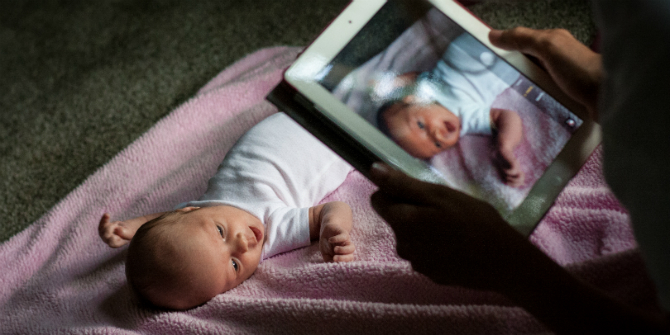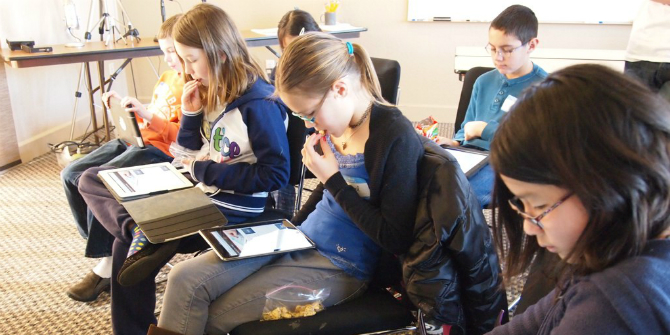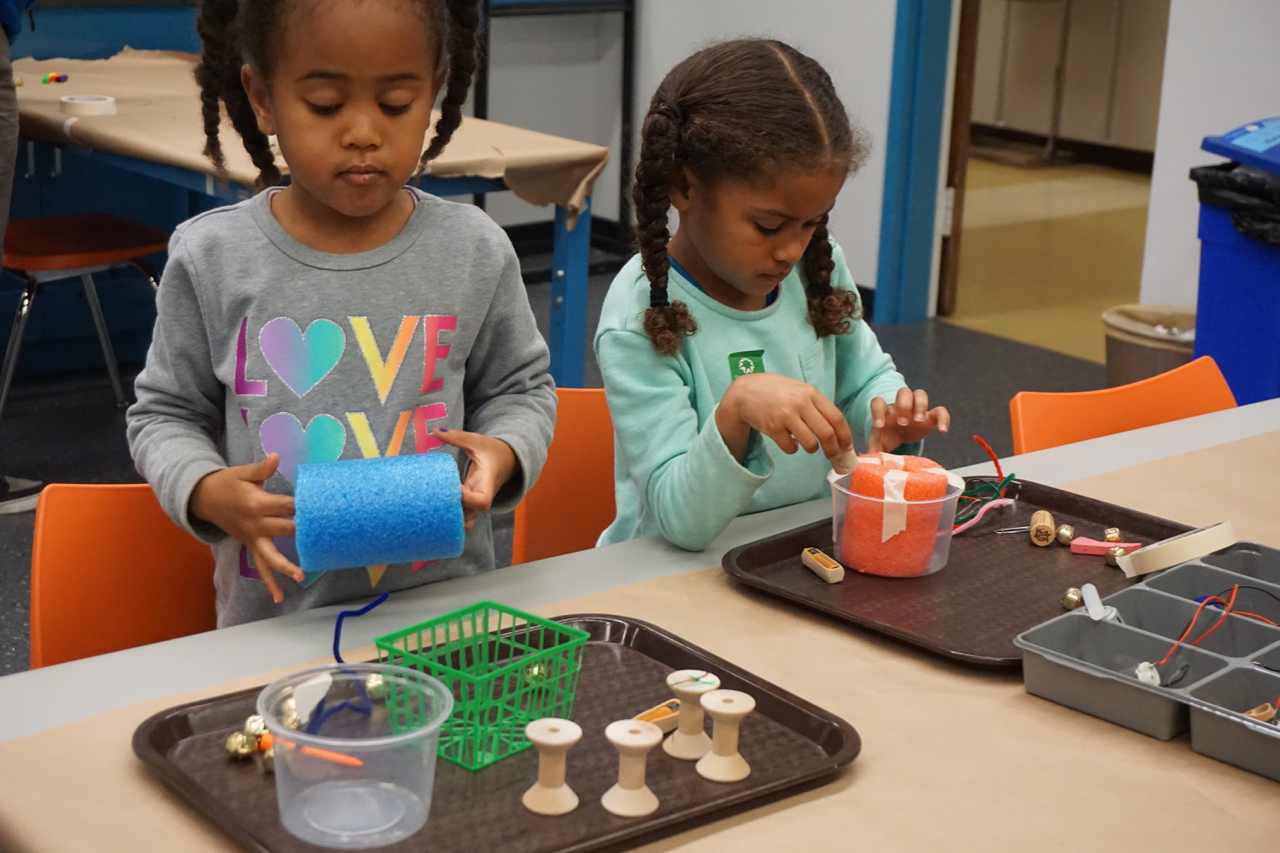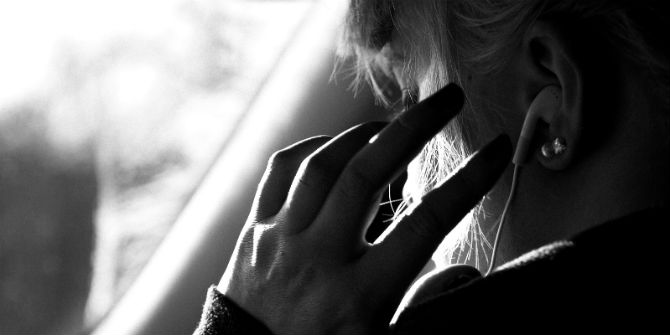 Alicia Blum-Ross shares insights from the Parenting for a Digital Future project and how parents assess the risks and benefits of ‘sharenting’. She discusses how parent bloggers decide what is OK to share online, where and with whom, as well as how they imagine their children will think about what they have chosen to share when they grow up. Alicia is a researcher at the LSE’s Department of Media and Communications. In addition to her work on the Parenting for a Digital Future research project, she is interested in youth media production. [Header image credit: MjZ, CC BY-NC-ND 2.0]
Alicia Blum-Ross shares insights from the Parenting for a Digital Future project and how parents assess the risks and benefits of ‘sharenting’. She discusses how parent bloggers decide what is OK to share online, where and with whom, as well as how they imagine their children will think about what they have chosen to share when they grow up. Alicia is a researcher at the LSE’s Department of Media and Communications. In addition to her work on the Parenting for a Digital Future research project, she is interested in youth media production. [Header image credit: MjZ, CC BY-NC-ND 2.0]
From ultrasound photos and birth announcements to chronicling the first day of school or commiserating about the behaviour of teens, social media are often the first place parents turn to share milestones and daily highs and lows. Sometimes called ‘sharenting’ – a term that may seem critical of ‘over’ sharing or just as describing how parents post photos of their children – this is one of the most distinctive practices of modern parenting, and also one of the most controversial.
Sharenting builds on family traditions of baby books and family photo albums (along with generations of writers and photographers using their children as creative inspiration), and it challenges these by bringing them into a distinctively digital age. Unlike the yellowing album pages of my own childhood, newly ‘spreadable’ digital media shares content with welcomed new or wider audiences, though it’s also possible for posts to go ‘viral’ out of a parent’s control. Often decried as narcissistic or naïve, potentially violating children’s privacy by establishing their ‘digital tattoos’ before they are able to give consent, questions loom as to the ramifications of sharenting for children and parents in the future.
Critiques of sharenting typically assume that parents have shared information that belongs to someone else. This atomized, bounded way of imagining identity is built in to the structure of most social networks – for example, on Facebook, having ‘multiple identities’ is seen as ‘lacking integrity’. Yet, most psychological theories of identity disagree that there is such a thing as a single bordered self, arguing that our identities are constructed in relationship to others.¹
The connection between parents and children is ready evidence of this – as anyone who has ever picked their toddler’s nose can tell you, your child is not you but they are not not you either. Thus it is difficult to determine when parents are sharing about themselves as parents, and when they are sharing about their children. There’s a fine line between ‘telling your own story’ as a parent and speaking on a child’s behalf.
As we wrote before, sharenting brings benefits to both parents and children. In Parenting for a Digital Future, we are examining how parents assess the risks and benefits of ‘sharenting’, deciding what is OK to share, where and with whom. How, we wondered, do parents imagine their children will think about what they have chosen to share, when they grow up? We interviewed 17 parent bloggers in depth (12 mothers and five fathers) about how they think about their own social media use, as part of our wider research interviews with 72 families.
Parent bloggers are heavy social media users, and they face more extreme versions of the dilemmas facing most parents. Many bloggers are actively engaging with these questions – discussing openly what they will and won’t share. They agreed among themselves on some points (e.g. no fully naked pictures, for most no pictures of tantrums), but they varied a lot in whether and how much they worried about privacy. Some tried hard to keep their blog anonymous (not including photographs or only ones with no faces), whereas others were comfortable with full disclosure.
And yet, for all the benefits of using social media outweighed the concerns. Blogging and social media (Instagram was especially popular) helped them keep in touch with family and friends, build communities online and face-to-face, get practical advice and keep a record of their family experiences. For some blogging provided an income, from sponsored posts and advertisements or linking to related businesses, although the income from the blog was considerable only amongst the ‘top’ bloggers.
Blogs were often described as something done for one’s children or family (as a chronicle, for the money/stuff). But also, in the words of one blogger, it is something done “for myself.” One ‘mum blogger’ loves being “able to tell your own story” and another even called it “self-therapy.” Many women had started blogging while pregnant or on maternity leave, using a blog (and associated social media built around it) as a way of combatting feelings of isolation. As one blogger who decided not to return to work reflected,
While it was lovely taking care of the kids, my mind was starting to go… I wasn’t depressed but I wasn’t happy. It gave me something a bit extra, something that was for me and not just as a mum.
Another mother, who had left work to care for her child with disabilities, joked about how her blog was
one of the bits of me that’s me, the one that sits in a bar with a glass, no, a bucket of wine – and a packet of fags… [who] doesn’t exist in someone else’s world.
And yet, the social media-using parent is never really alone. In every case there is the heavy presence of a child, or indeed a partner, friends, the blogger’s own parents and beyond. Our interviews show an uncomfortable balancing act, in which the parents shift between what they want and gain from their social media use for themselves, versus how they see its role for their children.
For parents of small children this is hypothetical – imagining how a future child might later view their parent’s social media use. Many hope their child(ren) will be happy to have so many memories chronicled, but others were more cautious. One blogger had written a post about how frustrating she found trying to cook with her three-year-old daughter but had kept it in draft form, describing how
I am just really conscious that she will grow up and read it
and worried that the daughter might feel betrayed by the post, thinking “I used to love baking with my mum, but she didn’t like it.”
For those with babies and toddlers, parents’ rights to share feels relatively uncontested, but as the children grow, this shifts. A blogger with a teenage daughter told us
the trajectory seems to be that until your child can read… you have a kind of… content ownership of your kid or something… [then] one day, [my daughter] said to me are you going to post about this on the internet? I was, like, holy fucking crap.
A dad blogger had to confront this issue directly when his six-year-old son expressed discomfort at appearing on the blog. He began to ask
is this a photo for you, Daddy, or is it a photo for the blog?
Increasingly, his son would refuse to be in pictures, eventually extracting revenge by covertly using the dad’s phone post an unflattering picture on his dad’s Instagram feed. Rather than shut down the blog entirely, father and son were working together to decide what should be included so that the son could feel more “in control” – but juggling the different priorities (to the father’s own desire to continue blogging, to the son’s desire to control what was written, to the blogging community that the dad had become a part of) was not always straightforward. For these bloggers there is therefore a new struggle, how to maintain a space that one has so lovingly carved out, and stay in touch with their online community (the ‘readership’), without impinging on the child’s right to control their own identity online.
For parents, these digital dilemmas are intensified by the twin truths that to represent one’s own identity as a parent means making public aspects of a child’s life. And yet, because they are the parent, they are precisely the person primarily responsible for protecting that child’s privacy. While it is tempting to exhort parents to ‘share nothing’ in order to prioritise their children’s (potential future) needs above their own, this would miss the point. Stories are not the pure creations of autonomous individuals; parents and children engage with these questions iteratively, in response to their particular circumstances and needs. So rather than approaching parents as if self-abnegation is the only path, telling them they need to give up on connections they value, we might view parents and children’s rights as intertwined – with thoughtful, well-informed approaches to privacy and sharing benefitting both rather than one or the other.
NOTES
This post is a summary of an article by Alicia Blum-Ross and Sonia Livingstone in Popular Communication, the full article can be accessed here.






